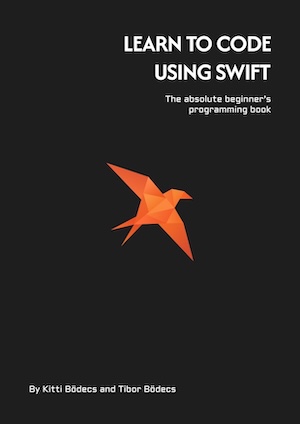Tibor Bödecs shared his learnings on his iOS development on his blog for almost a decade, before transitioning to server side Swift. After having published a book on the topic, founded a software development and consulting company, and created a few open source projects, he is now a member of the Swift Server Workgroup.
Today Tibor announced a new book, written together with his wife, Kitti Bödecs, for beginners and advanced alike: Learn to Code Using Swift.
In this episode, besides sharing his story, Tibor discusses how his company, Binary Birds, is pushing for server side Swift adoption in large companies, and the challenges of convincing decision-makers that Swift isn’t just “an Apple thing”. The conversation also covers the differences between Vapor and Hummingbird, his open source projects (including what makes his last one, Toucan, unique), and brings the background story about his new book. Check it out!
Swift Toolkit
Tibor
Hello, it's a pleasure to be here!
Swift Toolkit
As the regular icebreaker that I do usually, tell me a little bit about your first moments programming and later on how you got into Swift.
Tibor
I think the first line of code that I wrote happened when I was 11 or something like that. I was using my old Intel 486 machine with TurboPascal and I was learning German in school, so it was really hard to remember all those keywords, but I loved every single moment of it.
After that I focused on PHP and worked as a backend developer for about five years. Then I switched to iOS development and learned Objective-C, and when Apple announced Swift, the rest is history.
Swift Toolkit
Yeah, like many of us have this iOS background and Objective-C, and I think Swift brought the good things about Objective-C and added more good stuff on top.
Tibor
Yeah, definitely. Optionals were very hard to grasp for me at first, but it felt so nice to leave Objective-C behind. I also know a lot of JavaScript and Node.js from the server side, and Swift felt like JavaScript a lot.
So it was a very good improvement over Objective-C.
Swift Toolkit
Today we're gonna talk a little bit about server-side Swift, about the company you run, Binary Birds, and also an open source project, Toucan. Let me start from the first time maybe I saw content from you was in TheSwiftDev.com. When did you start?
Tibor
I started about 10 years ago. I was still working for this company doing mobile application development and I believe Swift was announced about a year before I started to write about it.
It just felt natural to write all the things that I learned. I was just writing down my learnings and ideas and findings.
Swift Toolkit
And what are the topics that people like the most or you enjoy the most writing about?
Tibor
In the past I was writing quite a lot about iOS development and maybe a little bit about macOS and how to create UIs and architecture. Then five years ago, I shifted towards server-side Swift articles and started to write more about the Vapor Web framework.
That was quite a big success because everyone else was writing about iOS development and I believe that I was able to provide a unique perspective and overall better server-side Swift content for the community.
Swift Toolkit
I totally understand and I also feel something similar because tooling is a subject that in some ways it's a niche. You also have a book about Vapor, right?
Tibor
Exactly. I've written a book called Practical Server Side Swift and it features the Vapor Web Framework. Hopefully I can update it very soon.
I believe tooling is extremely important and what you do here is pretty amazing. In the Swift world, we should really improve our tools and documentation.
Swift Toolkit
Thank you so much for the nice words. And how did your work evolve in the server area? You have your own company nowadays, right?
Tibor
That's right. In the beginning it was just me and I was basically playing around with Vapor and trying to create some smaller engines like a blog engine. After that I realized that this could be something more, something serious.
When I started to create a content management system, I realized that I simply need more people to achieve my long-term goals. That's why we established Binary Birds.
Now we are providing server-side Swift development and consulting services for our clients and customers. Hopefully we can grow in the future.
Swift Toolkit
Is there any specific area that you focus more?
Tibor
Our main focus is the enterprise and we are trying to bring Swift to the enterprise world. That's a very difficult thing to do because nowadays mostly indie developers are using Swift on the server.
Since there are no proven methods how to build big and complex applications using Swift, that's the main goal that we want to solve and achieve. We want to bring more people to the community and convince more companies to use Swift on the server because it's extremely powerful.
It has a low memory footprint, it's cost effective. So it has clear benefits.
Swift Toolkit
But what are other challenges that you face besides convincing them?
Tibor
One of the main challenges is that people, especially in manager roles, still believe that Swift is an Apple thing. So it's only good for building mobile applications and it's very hard to explain why Swift is not just only an Apple thing and how Swift evolved.
The ecosystem is still smaller than Node.js or Rails. I think there are two aspects: First, you have to get more developers involved and teach them how to use Swift on the server. Second, you have to convince decision makers to actually use Swift on the server for their upcoming projects or to integrate it somehow with existing systems.
This can be nicely done via APIs and since we have OpenAPI generator and the protocol buffer library, our tools and frameworks are constantly evolving. Hopefully we are going to reach this goal to bring Swift to the enterprise.
Swift Toolkit
And apart from trying to increase the adoption of Swift on the server in the enterprise world, what other projects are you working on?
Tibor
At Binary Birds we are trying to build our own products and the very first product is called Toucan. It is a static site generator and we are heavily using it.
It was announced publicly a year ago at the Server Side Swift conference. Now we are preparing for our next major milestone and we are trying to create a theme store for Toucan.
Swift Toolkit
Very cool. But what inspired you to create it? Because we already had Publish from John Sundell for example. Why did you feel there was a need for an alternative in Swift?
Tibor
First of all, I'm a blogger, so I needed something to generate my websites. The problem with Publish was that I had to use Swift. Since I already know HTML and CSS, I was able to create my own templates without using Swift. This is how most of the static site generators operate.
This is a huge difference between Publish or Ignite from Paul Hudson because if you use those static site generators, you have to use Swift to create the templates. But I believe that you should let front-end developers to build templates and themes for these kinds of generators.
As a content writer, you should only focus on your content, which should be written using Markdown. I believe that we have a slightly better model by separating the content and the themes and giving the ability to front-end developers to build their own themes without knowing Swift.
Swift Toolkit
I see. And how does it compare to other tools that are not in Swift, such as Jekyll or Hugo?
Tibor
Quite a lot of people are using Jekyll and Hugo and we can clearly see some issues over there. We are also trying to migrate some websites to Toucan. The main problem with those generators is that you mix up your content and your themes in most cases.
So it is very hard to split the content from the theme when we migrate to Toucan. Of course you have to install Ruby if you want to use Jekyll. Hugo is a bit more similar to what we have with Toucan since you have a binary or you can use Docker to generate the websites.
But I believe that we have a simply better modern approach.
Swift Toolkit
And what's the current status of it? You launched a year ago. How production ready is it? What do you feel is still missing?
Tibor
I would say it's production ready. We are using it. Amazon is using it for the developer podcast website. Sebastian, also a member of the Server Side Workgroup, gave me some really good feedback.
I think we should improve documentation a lot more. That's definitely a big challenge for us. We would love to hear more feedback from the community and we should also create more and more themes to get more people on board.
I think creating more templates to get more people on board without having the need to create their own themes for Toucan is gonna be a nice next step.
Swift Toolkit
Definitely, that makes total sense. Now, shifting a bit into the community. As someone who wrote a book on Vapor, you probably also worked with Hummingbird and you wrote some blog posts about it on SwiftOnServer.com. How would you compare the two frameworks?
Tibor
Vapor is an older and more mature framework with quite a lot of good documentation and we have books. I wrote one, Tim has one book about Vapor, and there are quite a lot of good resources all around the internet. So it is very easy to get started with Vapor.
It's well maintained and the new version is going to arrive. I don't know when, but Vapor 5 is going to be amazing, I'm pretty sure about that.
On the other hand, Hummingbird is a new framework and it's lightweight. It's faster, it's built using modern Swift concurrency features and it just shines in terms of performance and extensibility. All the other features that Adam built for Hummingbird are pretty awesome.
We are actually using both frameworks at Binary Birds and we are extremely happy with the results. Hummingbird is fast, it's crazy good! The main difference is going to be the number of resources and articles and guides that you find online.
Swift Toolkit
Yeah, I agree. The examples project, whenever I have something that I need to build and I'm not sure the way to go, I check the examples repository. How do you feel the Swift Server Workgroup is shaping the ecosystem? What are the opportunities you are seeing in the coming year and beyond?
Tibor
As a member of the workgroup, I believe that our main goal is to bring Swift to more and more people. Right now, people who are working on SwiftNIO are trying to bring NIO to Windows and other platforms. That's going to be a huge milestone.
I've seen in the statistics on my blog that more and more people are looking for Swift on Windows and keywords related to this. So it would be amazing if NIO could work properly on Windows. I think that's going to open new possibilities for server-side developers.
I'm also eager to see more and more libraries and the whole incubation process. We are trying to provide more guides on how to build libraries and give instructions to library authors on how to build strong foundations.
Swift Toolkit
And as a member of the Swift Server Workgroup, I assume that you're gonna be in a month from now in the server-side Swift conference this year in London.
Tibor
That's correct. I'm very excited about the conference this year. As Binary Birds, we are also sponsoring the conference and I'm eager to see all the new talks.
This year there's going to be a workshop and I'm very curious how that's going to turn out. I can't wait to meet all the people from the community. So exciting times.
Swift Toolkit
The server-side Swift conference is gonna happen on October 1st until October 3rd in London. The last topic of today is your book that you just published this week. So congrats for that. Learn to Code Using Swift. Tell me a little bit about it, how the idea began, why did you decide to focus on learning to code instead of teaching existing programmers advanced things?
Tibor
We just published Learn to Code Using Swift and it is a book that we've created together with my wife. Prior to this book, she was a UX designer and she had no knowledge how to code at all. She was interested about learning how to code.
That's why we've created this book to help absolute beginners to learn using Swift. I believe that our approach will bring a unique perspective for all beginners because she was completely new to this topic and I have more than 10 years of experience using Swift.
It's modern, it's up to date, it covers most of the available Swift features like modern concurrency practices, ownership and it scales from the very beginner level to an advanced level.
Swift Toolkit
And what were the biggest challenges you felt when writing the book?
Tibor
I can only quote my wife. She said: "I was torn apart between roles because I was reading and practicing and writing at the same time." It just felt overwhelming for her. So that was the most difficult thing because she had to learn, she had to write and all these things.
Personally, the hardest thing for me was to find time to review and proofread everything. Kitti made an enormous amount of content for this book. We have more than 600 pages and it's gonna be even more.
Swift Toolkit
It's for sure a unique perspective of someone who's learning and you making sure everything is correct. I think that's the first book with this approach for Swift.
Tibor
I believe it has a gentle learning curve. No prior programming experience is required, which is not just a phrase in this case. We actually try to explain all the programming concepts and other fundamental definitions in each chapter, providing hands-on examples alongside the main content.
So I believe this is quite a unique approach.
Swift Toolkit
And what parts of it are you most proud of or you want the readers to learn?
Tibor
For me, maybe the variadic generics. That's a very hard topic to understand and I believe that even absolute beginners can easily learn and understand these kinds of topics because Kitti did a very good job explaining all of that - variadics, ownership model. Those are extremely difficult topics.
Generics, concurrency, things like that. We can't wait to get more feedback about the book and improve it over time because it's like software - it's never ready. That's the reason why we started a private Discord server and whoever buys the book can join and ask questions.
The book is also great for more experienced developers because when I was proofreading some chapters, I even learned some new stuff, which was unbelievable after using Swift for a decade. So it should be good for anyone interested to deepen their Swift knowledge.
Swift Toolkit
Amazing. We're going to leave a link to the Gumroad page here for anyone who might be interested in the book. To wrap up, if you could give one piece of advice to a beginner Swift developer and to an advanced Swift developer, what would they be?
Tibor
For beginners, I would say don't be afraid to ask questions and contribute. Go to the forums, go to Discord and Slack channels. There is the open source Swift channel - it's a Slack channel. Go there, ask questions and go to the Swift forums and post topics over there.
I believe this is a very helpful and nice community and we don't bite. So feel free to ask anything.
Swift Toolkit
We spoke about Hummingbird and Vapor, we forgot to mention they also have great Discord servers. We're also gonna leave links for them.
Tibor
For advanced developers, I would say learn modern concurrency. I know it's a mess and it's very hard to grasp isolation and actors and the syntax and the keywords. Maybe that seems too much at first sight, but I believe that it is worth it and it's better on the server side.
I know it's frustrating when you try to build an iOS app and you have to mark all your types and functions with those keywords, but it's way better on the server side. Let's hope for the best and I believe that Apple will improve the developer experience.
It's very important to build safe and modern applications and that's going to be a foundation of future apps. So learn concurrency.
Swift Toolkit
Yeah, that's something I haven't done to the full extent and it's still on my to-do list. If people want to find you online...
Tibor
Feel free to reach out to me using my email address, my blog or on social media. I'm happy to answer all of your questions.
Swift Toolkit
Perfect, we'll leave links in any case.
Thanks so much Tibor for joining and sharing your insights!





